
Benitoite Gemstone: Properties, Meanings, Value & Mines
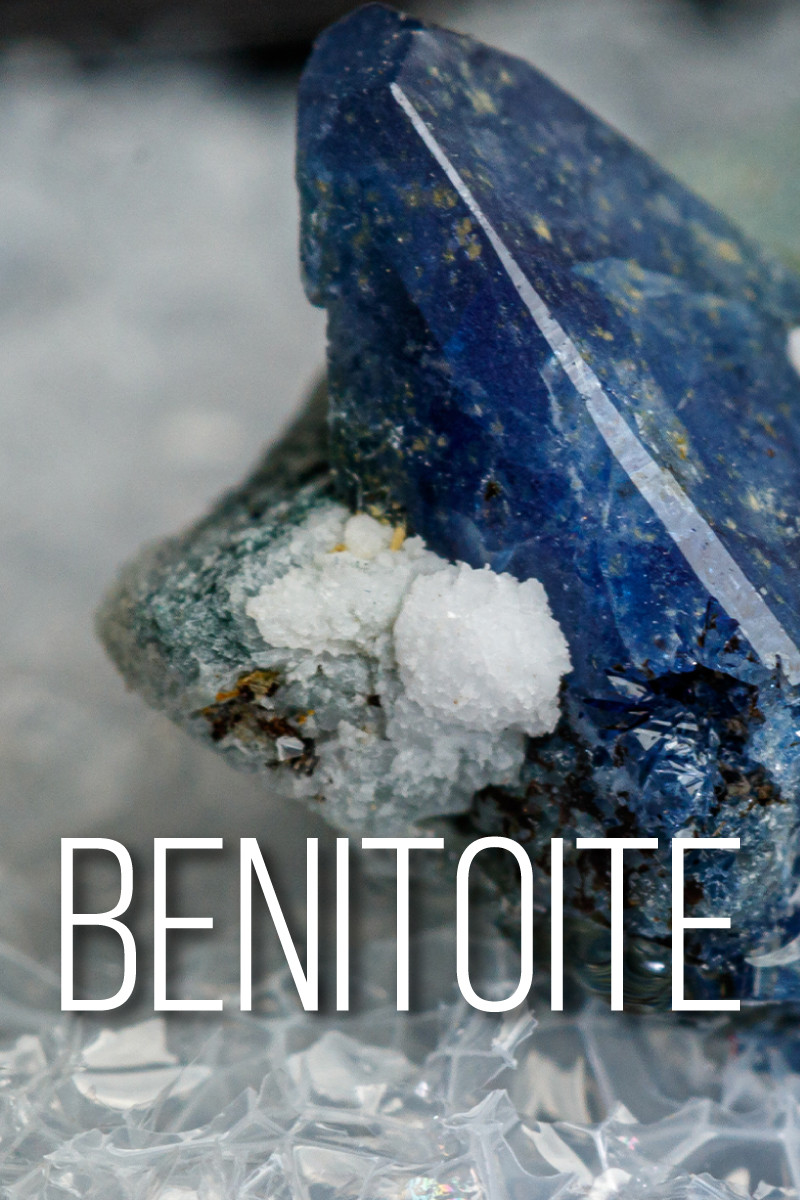 Benitoite (beh·nee·tow·ite) is a sapphire-blue to colorless gemstone from California, USA. Besides being the state’s official gemstone, benitoite is also famous for its extreme rarity and attractive sparkling qualities that rival (or exceed) even diamond.
Benitoite (beh·nee·tow·ite) is a sapphire-blue to colorless gemstone from California, USA. Besides being the state’s official gemstone, benitoite is also famous for its extreme rarity and attractive sparkling qualities that rival (or exceed) even diamond.
The vibrant, deep blue color of benitoite gemstones is comparable to tanzanite, another one of the world’s rarest gemstones. Both rank on our all-time top 10 gemstones.
How rare is benitoite, exactly? The San Benito Mine in California is the only known benitoite mine for gem-quality stones. This mine only produces around 300 cts of gem-quality benitoite annually, and only about 5,000 cts since the mine opened. For reference, Tanzania (the only source for tanzanite) produces about 270 million cts of tanzanite each year.
What else makes benitoite special? We’ll tell you in this guide, where we’ll cover all the information about benitoite gemstone properties, history, prices, and more!
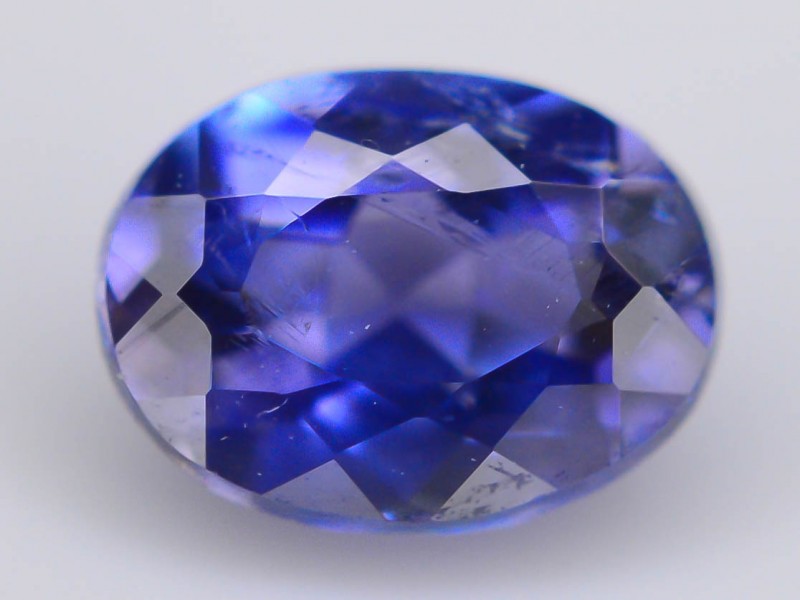
About Benitoite Gemstone
Benitoite is a semi-precious gemstone, but rivals many precious gemstones in refractive index, dispersion, and brilliance.
In fact, benitoite’s refractive index is one of the highest of all gems, even behind sapphire and ruby. Refractive index influences a stone’s brilliance, or the sparkle of light reflected from the stone’s interior.
Benitoite outranks every precious gemstone, including diamond, in dispersion, the fiery color flashes bouncing off the stone’s surface.
All this considered, some newlyweds seek out a benitoite engagement ring. While you won’t find any gems larger than 1 ct, these rings are one-of-a-kind and represent a financial commitment to the relationship.
Plus, if your fiancée is a Virgo (for whom benitoite is a zodiac stone) or native to California, a benitoite ring carries extra significance!
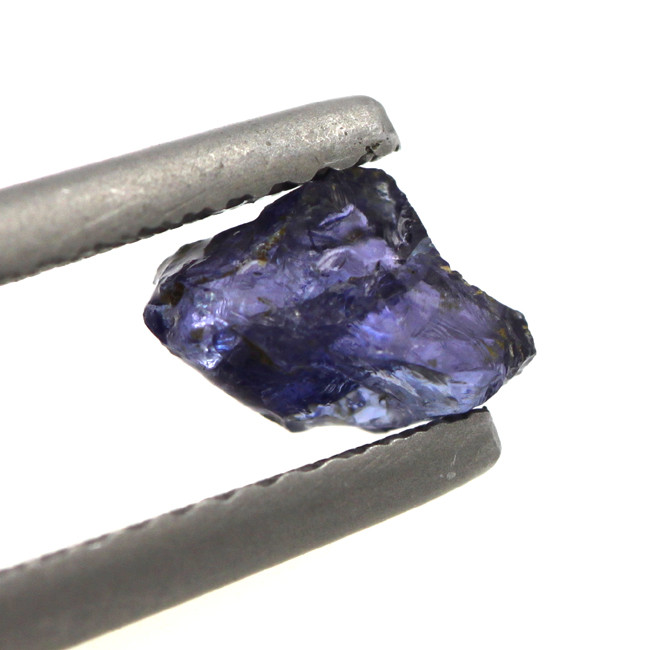
Benitoite Specifications & Characteristics
The benitoite mineral is composed of barium, titanium, and silicate, sometimes with sodium impurities. The stone belongs to its own mineral group. It may be confused with the similarly spelled clay mineral, bentonite.
What is the cleavage of benitoite? The stone has poor (indistinct) cleavage, meaning it’s less vulnerable to a sharp break than a gem with perfect cleavage (like a diamond).
How do you identify benitoite?
The first method is looking at the crystal structure. Benitoite has a unique hexagonal crystal system with ditrigonal, dipyramidal crystals. Before benitoite’s discovery, mineralogists had never seen crystals with this structure.
Another identifier is fluorescence. Blue benitoite shows strong, chalky-blue fluorescence under short-wave UV light, often with a stronger glow at the center than the edges. In long-wave UV light, centers of colorless benitoites glow in muted red, while the edges won’t fluoresce.
Lastly, you can use a Refractometer to determine whether the stone has benitoite’s refractive index (RI). Often, benitoite’s RI will be over the limit (above 1.80) of standard Refractometer readings.
Check out the remaining characteristics below:
Color: Blue, violet-blue, colorless, and rarely pink
Crystal structure: Hexagonal
Luster: Vitreous (glass-like) to sub-adamantine
Transparency: Translucent to transparent
Refractive index: Over the limit; 1.757-1.805
Density: 3.64-3.68
Cleavage: Poor/Indistinct on [1011]
Fracture: Conchoidal
Streak: White
Luminescence: Fluorescence; Strong chalky blue-white in SW-UV; Muted red in LW-UV
Pleochroism: Strongly dichroic in colorless to blue
Wondering what benitoite means? Read on!
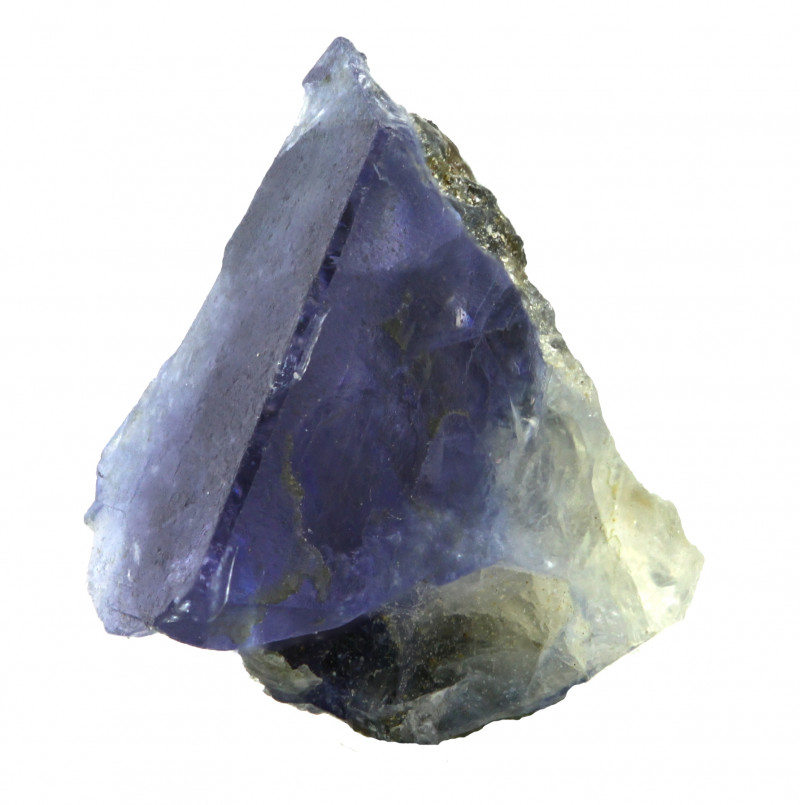
Benitoite Meaning & History
The word benito is a Spanish surname meaning “blessed.” This reflects benitoite gemstone’s meaning of bliss and beauty — along with anyone lucky enough to snag a benitoite gem!
Some say benitoite’s strong dichroism represents its ability to connect the physical and spiritual realms. Benitoite’s spiritual meaning is one of higher awareness, intuition, and discovery.
History
James Marshall Crouch, an amateur prospector, discovered benitoite in 1906-1907 near the San Benito River in California. He’d been grubstaked (given money and supplies to find ore and share future profits from it) by another prospector, Roderick Dallas.
Crouch initially believed the mineral to be sapphire or spinel, so he told Dallas and they claimed the area as the Dallas Gem Mine. They sent the minerals to Dr. George Louderback, a mineralogy professor who realized it was a new mineral. Louderback named it “benitoite” after the locality and published his findings in July 1907.
A flock of investors tried to secure marketing rights, and the San Franciscan Shreve and Company won. For over a century, the Benitoite Gem Mine went through expansions, closures, new names, and ownership transfers.
In 2005, the mine was sold again and eventually turned into a pay-to-dig site where guests can search through material for the gem.
So, if you’ve wondered, “Where can I hunt for benitoite?” The Benitoite Mining Company (its current name) is your answer!
On the metaphysical side, what does benitoite crystal do?
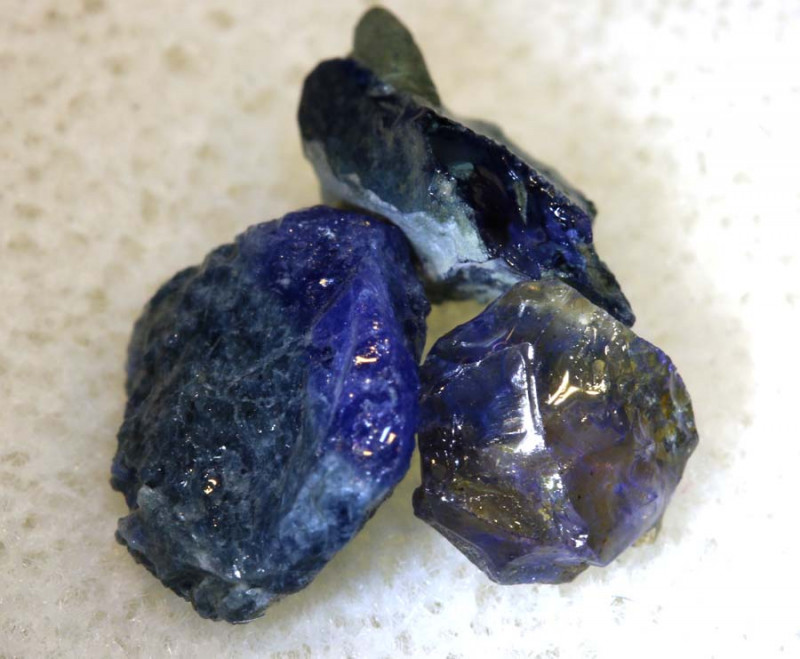
Benitoite Healing Properties
Like any gemstone, benitoite’s spiritual energies and coloring make it a useful healing stone. Benitoite, with other blue gems, represents the sea and sky — combining mysterious depth with limitless potential.
Many crystal healers harness benitoite for self-reflective meditation, along with astral travel or communication with divine realms.
How is benitoite used for other types of healing?
Physical Healing
The most popular physical benefit of benitoite is restoration. Benitoite stone is said to re-energize you both physically and mentally. It can also motivate those who struggle with low energy to push through fatigue. Additionally, crystal healers use benitoite crystal to help with blood disorders.
Emotional Healing
Does it ever feel like your emotions are too overwhelming to understand? Benitoite may help to calm your mind. Benitoite uses in crystal healing are said to illuminate hidden truth, both in yourself and the world around you.
Plus, if you feel at the whim of overwhelming emotions, benitoite crystals can harmonize the rational and emotional brain hemispheres, helping you regain control and inner peace.
Chakra Healing
Chakra healing entails balancing your seven chakras (energy centers) to resolve negative symptoms indicating that one is blocked. Benitoite is a chakra stone for the third eye chakra, which represents holistic awareness of the physical world, spiritual realm, and the self.
A blocked third eye causes headaches, restlessness, and feelings of being trapped in your own head. Once you use benitoite to open it, your balanced third chakra will bring spiritual awakening and divine wisdom.
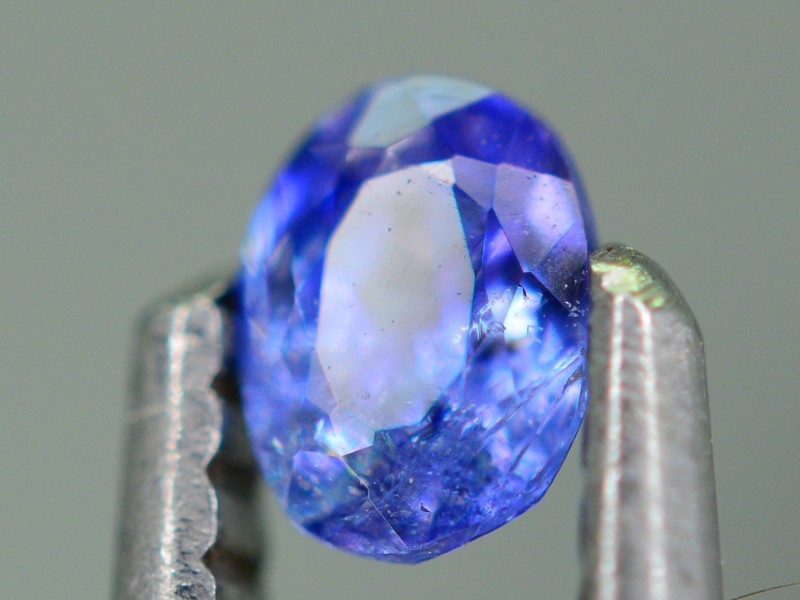
Benitoite Gemstone Properties
A gemstone’s objective value comes down to certain value factors (gemstone properties) that experts examine.
You’ll rarely see benitoite jewelry on the market, but gems hold value with collectors. Benitoite’s rarity greatly affects its value, but its color, cut, clarity, and carat weight also play a role.
Color
While blue is most common, other benitoite gemstone colors include colorless, yellow, and rarely, pink. Most benitoite crystals have blue borders, white centers, and translucence. Other specimens are opaque and blue-gray from crossite inclusions.
Why is benitoite blue, though? Nobody knows! Scientists have done numerous studies to determine the cause, but none can say definitively yet. One theory is that iron impurities go through a charge transfer (one electron gets excited and transfers to another ion) like that seen in Prussian blue colors.
Transparent benitoites with tanzanite-blue coloring are most valuable, while extremely pale or extremely dark stones are less valuable. One decision for buyers is color vs. sparkle. Deeper blue benitoite doesn’t display dispersion as well, but lighter shades do.
Cut
Benitoite’s rarity makes choosing faceted cuts tricky, as the lapidarist (gem cutter) must choose between the most beauty or least waste. Most opt for the latter, keeping as much material in the final gem as possible while settling for imperfect symmetry.
Lapidarists must cut blue benitoite along the correct orientation to best display the pleochroism. Most faceted benitoite gems are ovals, rounds, or modifications of either.

Clarity
Clarity describes a gem’s inclusions or (ideally) lack thereof. Benitoite is Type II on the colored gemstone clarity grade, meaning it usually has visible inclusions but top-quality benitoites don’t. These top-quality stones are called “eye-clean” and command high prices.
Common inclusions or blemishes in benitoite are pyroxene, amphibole, and fractures. These may form patterns in benitoite like needles and fingerprints (where it re-crystallized over fractures).
Carat Weight
The Benito mine has produced around 5,000 cts of benitoite rough in its history, about 50 percent of that in the first 60 years. The largest known benitoite recovered is only 7.8 cts.
Most benitoites are under 1 ct, and very few are over 2 cts. Therefore, benitoite price per carat dramatically increases by carat weight.
Treatments
Heat treatments can turn benitoite orange with pink and orange dichroism, but the stones are prone to exploding during this process. Therefore, benitoite is hardly ever treated.
Next, we’ll discuss how raw benitoite forms!
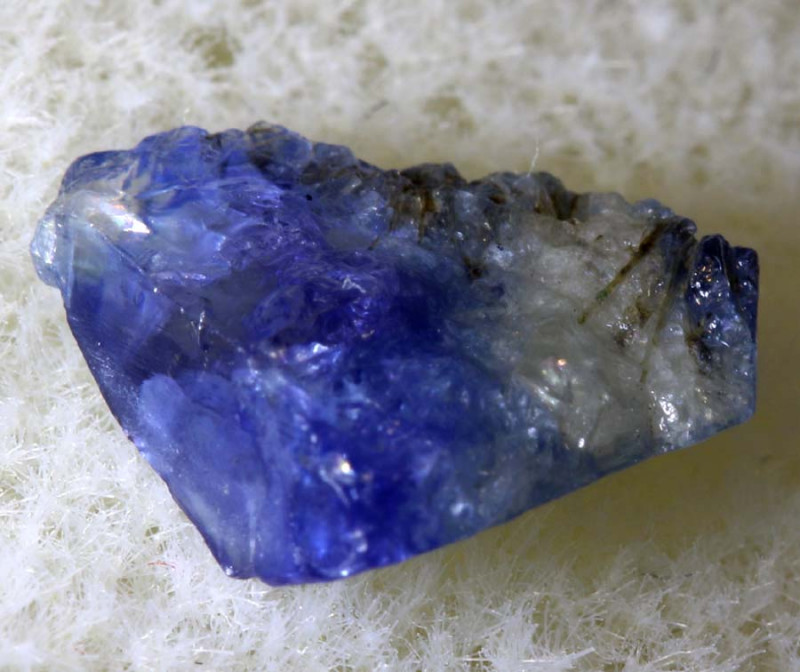
Benitoite Formation & Sources
What type of rock is benitoite found in? Benitoite minerals usually emerge encased by natrolite. These encased benitoite crystals are inside modified blueschist, which is inside serpentine. Blueschist’s “modified” aspect likely occurred through large-scale heat and pressure changes to serpentine in the area.
Benitoite’s exact formation process hasn’t been pinned down, as barium and titanium present together is uncommon.
Scientists generally agree that magma heats mineral-rich water underground, the water fills rock cavities, then it gradually cools and crystallizes into benitoite. Whether the barium and titanium come from serpentine, blueschist, or something else is unclear.
Mining Locations
Where is benitoite commonly found? As you know, gem-quality benitoite only comes from San Benito County, California, USA. The only other locations for benitoite minerals are:
Arkansas, USA
Australia
Czechia
Japan
Montana, USA
Romania
Russia
The big question is: how much is benitoite worth per carat?

Benitoite Price & Value
Faceted benitoite gems range from $1,500 to $8,000 per carat. Why is benitoite so expensive? Its extreme rarity and many impressive properties all contribute to benitoite’s steep prices.
Currently, the average faceted benitoite for sale costs $3,000 per carat. However, a 1-carat, inclusion-free benitoite gem can be $6,500 to $8,000. The average price for small carat-weights is $700 per carat.
Medium blue is most valuable, with these gems typically fetching around $4,000 per carat for 1-ct stones. Light gray-blue or violet-blue gems are usually $2,000-$3,000 per carat.
Very pale blue or colorless gems are often $1,500-$2,000 per carat. Benitoite rough ranges from $75-$400 per carat.

Benitoite Care and Maintenance
Knowing how to care for gemstones like benitoite can ensure your investment lasts a lifetime. Benitoite hardness is mid-range at 6 to 6.5 on the Mohs mineral hardness scale, and its cleavage is poor, so it’s fairly durable.
You can safely clean benitoite with the standard soft brush, mild soap, and warm water. Avoid cleaning heavily included stones with steam or ultrasonic cleaners.
Does benitoite react to acid? The gem will only react badly to hydrofluoric acid and fused sodium carbonate — ordinary acids won’t affect it.

Allured by the Beauty of Benitoite?
You don’t have to be a gemstone collector or California native to appreciate the beauty of benitoite — anyone ready to invest in this unique, sparkling blue gemstone can reap the benefits!
Search the Gemstone Encyclopedia
Related Auctions
Related Articles
Originally the Birthstones or gemstones were associated with a zodiac sign or the month of a individuals birth. Find out what your stone is and view the stones we have for sale
8th Feb 2021
There are dozens of quartz and chalcedony gems with various colors and patterns. Learn all about quartz properties and every type of quartz, from amethyst and agate to plasma and phantom quartz!
15th Oct 2020
Hackmanite is a pink to violet sodalite gem known for its unique color-change and luminescence. Learn why hackmanite is special, from its rare qualities to the types of hackmanite jewelry available.
28th Mar 2018
Latest Articles
Catapleiite is a lesser-known mineral and rare gemstone often found as stunning tabular rosettes near other rare stones. Discover the history, prices, benefits, and properties of catapleiite!
28th Apr 2025
Yugawaralite is a rare colorless, white, or pinkish zeolite crystal named for its discovery in Yugawara, Japan. Here we uncover the multifaceted history, properties, prices, and uses of yugawaralite.
24th Mar 2025
Simpsonite is a lesser-known mineral known on the gem market for its durability, yellow-orange color, and rarity. Discover all the properties, uses, prices, and history of simpsonite.
3rd Mar 2025
Article Categories
How To's is where you will find helpful articles from gem Rock Auctions on how to cut gemstones, select gemstones and buy gemstones.
9 Articles





